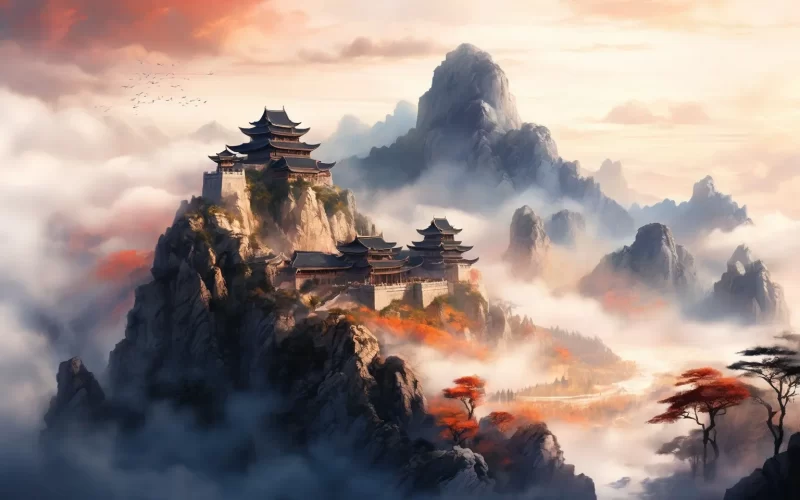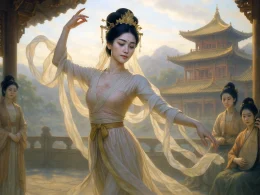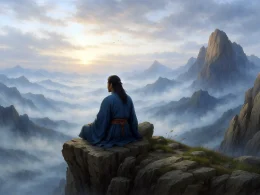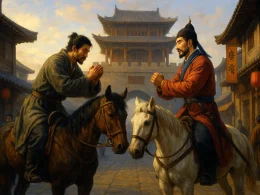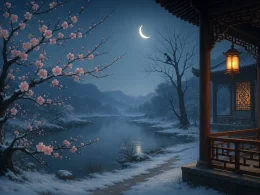Where a yellow river climbs to the white clouds,
Near the one city-wall among ten-thousand-foot mountains,
A Tartar under the willows is lamenting on his flute.
That spring never blows to him through the Jade Pass.
Original Poem
「出塞」
王之涣
黄河远上白云间,一片孤城万仞山。
羌笛何须怨杨柳,春风不度玉门关。
Interpretation
Composed around 750 AD during the High Tang period, this poem was written by Wang Zhihuan while traveling to Liangzhou (modern Wuwei, Gansu). Though the Tang Empire had stabilized its western frontiers, border garrison life remained harsh. As one of his frontier series, the work vividly captures both the majestic landscape and soldiers' solemn sentiments through concise yet powerful imagery.
First Couplet: "黄河远上白云间,一片孤城万仞山。"
Huáng Hé yuǎn shàng bái yún jiān, yī piàn gū chéng wàn rèn shān.
The Yellow River ascends far into white clouds; A lone fortress amid ten-thousand-foot peaks.
This grand opening constructs a vast, solitary frontier tableau. The Yellow River's upward trajectory ("ascends into clouds") creates celestial majesty, while the "lone fortress" appears minuscule against towering mountains, accentuating the garrison's perilous isolation. The spatial extremes ("far"/"ten-thousand-foot") amplify visual impact while subtly conveying the soldiers' vulnerable position.
Second Couplet: "羌笛何须怨杨柳,春风不度玉门关。"
Qiāng dí hé xū yuàn yáng liǔ, chūn fēng bù dù Yùmén Guān.
Why should Qiang flutes lament willow songs? Spring breezes never pass Jade Gate Pass.
Transitioning from scenery to emotion, the couplet uses musical metaphor to express homesickness. The "willow songs" (折杨柳), traditional farewell tunes, are dismissed as unnecessary—an ironic intensification of unspoken grief. The iconic line "Spring breezes never pass…" operates on three levels: geographical reality (harsh climate), political neglect (imperial indifference), and existential truth (hope's absence beyond the frontier).
Holistic Appreciation
In just four lines, this poem paints a majestic yet emotionally profound frontier landscape. The first couplet employs grand imagery - "Yellow River," "white clouds," "lonely fortress," and "towering mountains" - to depict the vast, desolate borderlands. The second couplet evokes soldiers' deep melancholy through the Qiang flute and "Breaking Willow" melody. The poet masterfully blends scene and emotion, progressing seamlessly from distant views to human sounds, from external environment to inner feelings. The perfect fusion of magnificent scenery and somber sentiment embodies the High Tang frontier poetry's characteristic "heroic grandeur imbued with pathos."
Artistic Merits
The poem demonstrates exquisite compositional technique, with the couplets alternating between movement and stillness, far and near, intertwining scenery and human emotion. Its concise language carries profound imagery, particularly the immortal line "Spring breezes never pass Jade Gate Pass," rich in symbolic meaning and emotional intensity. Through skillful use of contrast with words like "lonely," "distant," and "never pass," the poem intensifies emotional expression. Remarkably, while never explicitly mentioning "grief" or "sorrow," it overflows with melancholy, demonstrating the poet's masterful restraint and emotional depth - a testament to superb artistic expression.
Insights
This poem conveys not just the loneliness and sorrow of frontier soldiers, but also their unwavering sense of duty and patriotic devotion. It teaches us that in times of hardship and isolation, we should transcend mere lamentation and recognize our responsibilities. Just as the line "Why should Qiang flutes lament willow songs?" suggests, behind this self-consolation lies loyalty to country and conviction. In today's society, this spirit of elevating personal emotions into patriotic sentiment remains profoundly worthy of contemplation and inheritance.
Poem translator
Kiang Kanghu
About the poet
Wang Zhilu(王之涣), 688-742 AD, was a native of Taiyuan, Shanxi Province. Wang Zhilu was a bold and liberal character who liked to sing sad songs with a sword. His poems were so magnificent, passionate and musical that they were sung by musicians at the time and became a sensation. He sang and harmonized with Gao Shi and Wang Changling, and was one of the famous border poets of the Sheng Tang Dynasty. Most of his poems have been lost, and only six of them have survived, all of which are famous.






